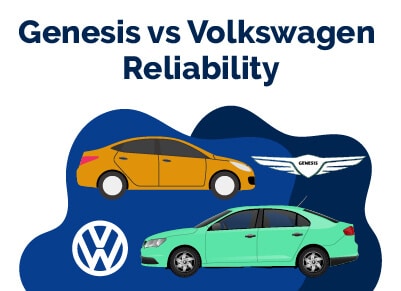Genesis vs Volkswagen: Which Is More Reliable?
June 18, 2023


Chris is Head of Content for FindTheBestCarPrice and is based out of Philadelphia, PA. As a seasoned automotive industry analyst and car enthusiast, he ensures the highest level of quality across all our content and curates our picks for the best deals each month.
Chris studied information systems and marketing at Drexel University and writes about a wide range of topics ranging from car buying tips to troubleshooting common mechanical issues.
When he’s not thinking about cars, he likes to stay in with his dog and make an “attempt” to finish a crossword puzzle (he’s not quite at the Saturday/Sunday level…yet). As a former cheesemonger, Chris still has a “sharp” passion for all things cheese, and his fridge is always loaded with it!
Chris also has a passion for things that go fast, and drones are no exception. He spends some of his time writing for Dronesourced.
From the sleek design of the Hyundai Genesis to the iconic Volkswagen logo, the automotive industry has always been a symbol of style and innovation. The Hyundai Genesis debuted in 2008, quickly establishing itself as a strong contender in the luxury full-size car market.
However, in 2017, Genesis spun off as a separate entity, rebranding the vehicle as the G80. This move reflected the company's commitment to pushing the boundaries of design and engineering.
Volkswagen has consistently earned acclaim for its steadfast dedication to producing exceptional-quality cars and fulfilling its clientele's needs, emblematically represented by its title, signifying "the People's Car."
Characterized by an ethos of forward-thinking inventiveness and conscientiousness towards the environment, Volkswagen has sustained its prominence as a forerunner in the automotive trade.
This article will cover all the facets of Genesis vs. Volkswagen reliability and reach an acceptable conclusion for prospective car buyers.
Table of Contents
- Genesis vs. Volkswagen Reliability: Detailed Comparison
- Which Is the Best Car: Genesis or Volkswagen?
- 1. Genesis vs. Volkswagen Reliability: Design
- 2. Genesis vs. Volkswagen Reliability: Repair and Maintenance Cost
- 3. Genesis vs. Volkswagen Reliability: Durability
- 4. Genesis vs. Volkswagen Reliability: Engine
- 5. Genesis vs. Volkswagen Reliability: Gas Mileage
- 6. Genesis vs. Volkswagen Reliability: Technology
- 7. Genesis vs. Volkswagen Reliability: Safety
- Final Verdict
- Best Car Deals by Category
Genesis vs. Volkswagen Reliability: Detailed Comparison
| Features | Genesis | Volkswagen |
| Design | ||
| Repairs and Maintenance Cost | ||
| Durability | ||
| Engine | ||
| Gas Mileage | ||
| Technology | ||
| Safety |
Which Is the Best Car: Genesis or Volkswagen?
When comparing the Genesis and Volkswagen, it is crucial to evaluate various factors to determine which vehicle is superior. Both cars boast impressive qualities, but deciding which reigns supreme can be challenging.
The Genesis, formerly the Hyundai Genesis, boasts refined styling, opulent interiors, and affordability. The vehicle's interiors are constructed with high-quality materials that cocoon passengers in a luxurious atmosphere.
Additionally, the vehicle's dependability score of 3.5 out of 5.0 situates it in the seventh position within the luxury full-size car category, a testimony to the producer's determination to furnish excellence and customer contentment.
In contrast, Volkswagen is celebrated for its unwavering pledge to provide unparalleled superiority and gratification.
The organization has a well-established culture of originality and sustainability, placing it at the forefront of the automotive sector.
With a reliability rating of 3.5 out of 5.0, Volkswagen is ranked twelfth among all car brands, underscoring its commitment to manufacturing first-rate automobiles.
The decision between Genesis and Volkswagen concerns personal preference and individual needs. The Genesis may appeal to those seeking affordable luxury, while Volkswagen's focus on innovation and sustainability may resonate more with others.
Both vehicles possess impressive qualities, and choosing one will depend on the driver's priorities.
Genesis and Volkswagen are exceptional cars catering to different types of drivers. Genesis offers luxury at an affordable price, while Volkswagen focuses on innovation and sustainability.
1. Genesis vs. Volkswagen Reliability: Design
In the battle for automotive excellence, the Genesis G80 stands out with its prime Nappa leather seats.
The high-end, full-grain Nappa leather undergoes minimal processing, retaining the hide's natural texture. The impeccable stitching elevates the luxuriousness of the interior, exuding sheer elegance.
Inspired by the 'beauty of white space, ' the dashboard's horizontal layout,' further enhances the sense of openness, while the slim air vents add to the car's sleek design.
The Genesis G80 Sport amplifies this elegance with intensified sporty vibes, both inside and out, further pushing the envelope of athletic elegance.
While Genesis exudes luxury and style, Volkswagen's culture of innovation cements its position as a top-tier automaker. The company's steadfast dedication to quality, customer satisfaction, and sustainability is crucial to its success.
Volkswagen's updated brand design reflects a fresh, human, open, inviting, transparent, responsible, and authentic attitude, setting it apart from its competitors.
Despite its reliability rating of 3.5 out of 5.0, which places it twelfth among all car brands, Volkswagen's culture of innovation earns it the title of the winner in this battle for automotive excellence.
Winner: Genesis
2. Genesis vs. Volkswagen Reliability: Repair and Maintenance Cost
The Hyundai Genesis is a favorable choice for annual maintenance costs, costing $565. Repair and maintenance costs vary based on several factors, including age, mileage, location, and shop.
Comparatively, Volkswagen has a higher annual maintenance cost of $676. Despite being subject to variability, these costs underscore the importance of carefully considering the expenses of owning a car.
Based on this analysis, the Hyundai Genesis emerges as the winner regarding annual maintenance costs.
Winner: Genesis
3. Genesis vs. Volkswagen Reliability: Durability
Genesis boasts an impressive potential lifespan of up to 200,000 miles, with typical odometer readings falling between 180,000 and 200,000 miles.
However, it should be noted that these figures are subject to fluctuation based on the owner's maintenance habits, as some vehicles have been known to exceed the 200,000-mile mark.
In comparison, Volkswagen has had its share of fluctuations over the years, with an average lifespan of 100,000 to 200,000 miles. While Volkswagen vehicles may not last as long as other brands, they still offer car buyers a reliable and long-lasting option.
Winner: Genesis
4. Genesis vs. Volkswagen Reliability: Engine
The core of the Genesis 5.0 R-Spec model is its state-of-the-art Tau V8 engine, which generates an impressive 429 horsepower at 6,400 rpm and a peak torque of 376 lb. ft. at 5,000 rpm.
Additionally, the model is available in a 4.6-liter V8 configuration and a 3.8-liter V6, offered in three different equipment setups.
For an even more dynamic driving experience, the 3.3L Turbo Gasoline Engine is equipped with a mid-phase air intake CVVT system and twin-turbo engine, complemented by an integrated exhaust head and electronic thermostat.
In contrast, Volkswagen's TSI engine stands for turbocharged stratified injection engine, a stratified charge engine utilizing innovative technology designed for gasoline engines.
Employing Volkswagen's most advanced FSI and TDI technologies, the compact TSI engine can deliver more power while consuming less fuel.
The EA888 engine family consists of three and four-cylinder engines utilized throughout the Volkswagen Group.
These engines represent an evolutionary step up from the earlier EA827/113 units, with a corporate VAG-designed unit that offers superior performance.
Winner: Volkswagen
5. Genesis vs. Volkswagen Reliability: Gas Mileage
The 2021 Genesis G80 exhibits impressive fuel economy, delivering up to 32 mpg on the highway, while the 2021 Genesis G70 closely trails behind with a maximum of 30 highway mpg.
On the other hand, the 2022 Volkswagen Jetta is the frontrunner in fuel efficiency among the 2022 VW models, with a remarkable 43 mpg on the highway.
Additionally, the 2022 Taos is the most fuel-efficient VW SUV available, providing buyers with up to 37 mpg on the highway.
The 2019 Volkswagen Passat combines style and fuel efficiency, achieving up to 36 mpg on the highway.
Winner: Volkswagen
6. Genesis vs. Volkswagen Reliability: Technology
Genesis offers a host of advanced features to elevate the driving experience. The BUILT-IN CAM feature allows drivers to remotely monitor the vehicle's surroundings and status using a smartphone app.
The Genesis Digital Key app provides convenient touch, remote control, and key-sharing capabilities with friends and family.
Wireless smartphone charging is also available, and an alert is triggered if the driver exits the vehicle with the phone inside.
The Lexicon 15-speaker system with Quantum Logic Surround technology delivers exceptional sound quality, clear projection, rich bass, and an immersive listening experience.
Meanwhile, Volkswagen has developed VW Car-Net, a software application suite that enables better integration between smartphones and vehicles.
With VW Car-Net App-Connect, available on select models, drivers can select specific smartphone apps directly from the vehicle's dashboard, including maps, music, messaging, and more.
Guide & Inform provides satellite navigation, traffic updates, and weather reports linked with SiriusXM Traffic and Travel Link.
Security & Service offers helpful features like locating your last parked location, checking if your vehicle's doors are locked, receiving vehicle health reports on your phone, and calling for emergency help.
Additionally, VW Car-Net App-Connect integrates directly with popular connected car technologies like Android Auto, Apple CarPlay, and MirrorLink, allowing drivers to use their familiar apps and stay connected without learning a new interface. Just plug in your smartphone and go.
Winner: Volkswagen
7. Genesis vs. Volkswagen Reliability: Safety
Genesis features a rigid body structure built with 51.5% advanced high-strength steel, providing exceptional precision and handling.
The 9-airbag system and automatic emergency braking system work together to provide exceptional protection in case of a collision, while high beam assist and driver attention alert help enhance driving safety.
On the other hand, Volkswagen offers standard safety features with the Volkswagen IQ.DRIVE suite.
This includes adaptive cruise control, active blind spot monitor, rear traffic alert, front assist, emergency assist, and lane assist, which help maximize safety on the road with sensors, cameras, and automated systems.
Winner: Genesis
Final Verdict
Both manufacturers offer impressive features that cater to drivers' needs and preferences, but Genesis edges past Volkswagen in the Genesis vs. Volkswagen reliability contest.
Best Car Deals by Category
Posted in Car Buying Tips, Car Troubleshooting |




